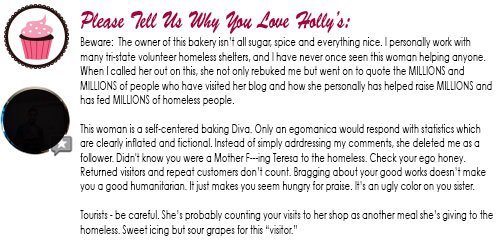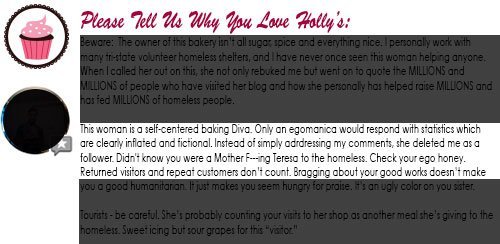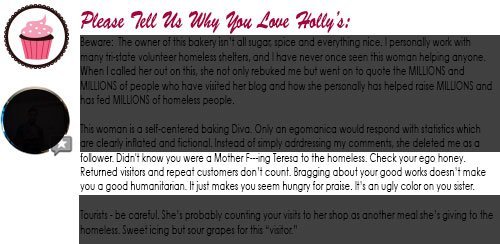When Cyber Bullying Turns Into Abuse
When do those stinging negative comments cross the line from a form of cyber bullying into abusive and hurtful attacks? After movements like #metoo and #sorrynotsorry, we might expect a kinder, safer world. Unfortunately, unkindness is alive and well. Many of today’s cyber bullying are abusive and include mansplaining, misogyny, trolling and defamation. Recovery gives us tools to cope.
Negative Comments Turn Into Cyber Bullying
Holly runs an inner-city bakery, and she raises money to help feed the homeless. On her bakery’s website, people can pre-order cakes and view her menu. She also has a blog where she shares recipes and occasionally writes about issues related to homelessness. Last month, her work with the homeless was featured in the local newspaper.
Of course, not everyone agrees on how to help homeless people. “Steve” is one such reader. He is furious with Holly, so he posted this retort about the newspaper’s article as a review of Holly’s bakery.

This is more than just a simple dissatisfied customer. This is cyber bullying. When we dissect Steve’s comment, we see he actually used four common tactics to attack Holly. The first of which is mansplaining.
What Is Mansplaining?
According to Miriam-Webster, mansplaining:
“Occurs when a man talks condescendingly to someone (especially a woman) about something he has incomplete knowledge of, with the mistaken assumption that he knows more about it than the person he’s talking to does.”
Here’s an example of mansplaining in action.
These sentences are examples of mansplaining because he, the reviewer, is not privy to the Holly’s statistics. Yet he thinks he knows more about her business, volunteer work and how to quantify them than she does. When you attack from ignorance your purpose is to hurt.
What Is Misogyny?
Per dictionary.com, misogyny is, “hatred, dislike, or mistrust of women, or prejudice against women.” In this example, the comments attack based on gender. He uses terms of endearment like “sister” and “honey” to insult.

This is a case of misogyny because the writer is a man and the target is a woman. If they were both of the same gender, we would still be looking at a patronizing case of intimidation.
What Is Trolling?
Wikipedia defines trolling as,
“A person who starts quarrels or upsets people on the Internet to distract and sow discord by posting inflammatory and digressive, extraneous, or off-topic messages in an online community (such as a newsgroup, forum, chat room, or blog) with the intent of provoking readers into displaying emotional responses and normalizing tangential discussion, whether for the troll’s amusement or a specific gain.”
Going back to our example, this entire review is an example of trolling. It’s off-topic because Steve’s concerns with Holly have nothing to do with her business or website. His anger is in response to an article published in an independent newspaper.
What Is Defamation?
Defamation is when a false statement is presented as fact to a third party. According to Legal Zoom,
“The difference between defamation and slander is that a defamatory statement can be made in any medium. It could be in a blog comment or spoken in a speech or said on television. Libelous acts only occur when a statement is made in writing (digital statements count as writing) and slanderous statements are only made orally.”

The comments in our example are in writing and nonfactual. Holly does not consider her paying customers to be homeless people. Steve’s scathing review is clearly meant to harm Holly’s business and livelihood. Therefore, this is a libelous act.
How To Respond?
Here’s why recovery is a game changer. Recovery teaches us so much more than how to be sober or quit using. Recovery shows us that we do have value, and recovery teaches us how to communicate even in difficult situations like cyber complaints.
To Stop Cyber Bullying, First, We Tell Someone
Abuse only survives in secrecy.
In this example, the writer wants to intimidate and silence. We often see this in family dysfunction as well. Families in crisis operate under three specific rules: Don’t talk, don’t trust, and don’t feel.
To get over such insults, we talk to someone we trust. Maybe it’s a sponsor or a counselor. We do not allow ourselves to be isolated. This only makes us more vulnerable to escalating cyber complaints.
After Sharing We Hit The Pause Button
Inflammatory responses do not require immediate reaction. It’s important to give yourself time to process your emotions and brainstorm with accountability partners.
We Use Social Media Tools To Protect Ourselves
Many social media accounts allow you to ban angry followers. You can also report harassing and inappropriate comments. Some defamation cases might require legal action.
What Can We Change
Finally, we change what we can. We cannot control bullies and trolls. At the end of the day, we can only change ourselves. We can’t stop someone from being mean or even lying about us in private or public. We do, however, have the ability to take action to protect our character, livelihood, and mental well-being.
The post When Cyber Bullying Turns Into Abuse appeared first on Reach Out Recovery.





